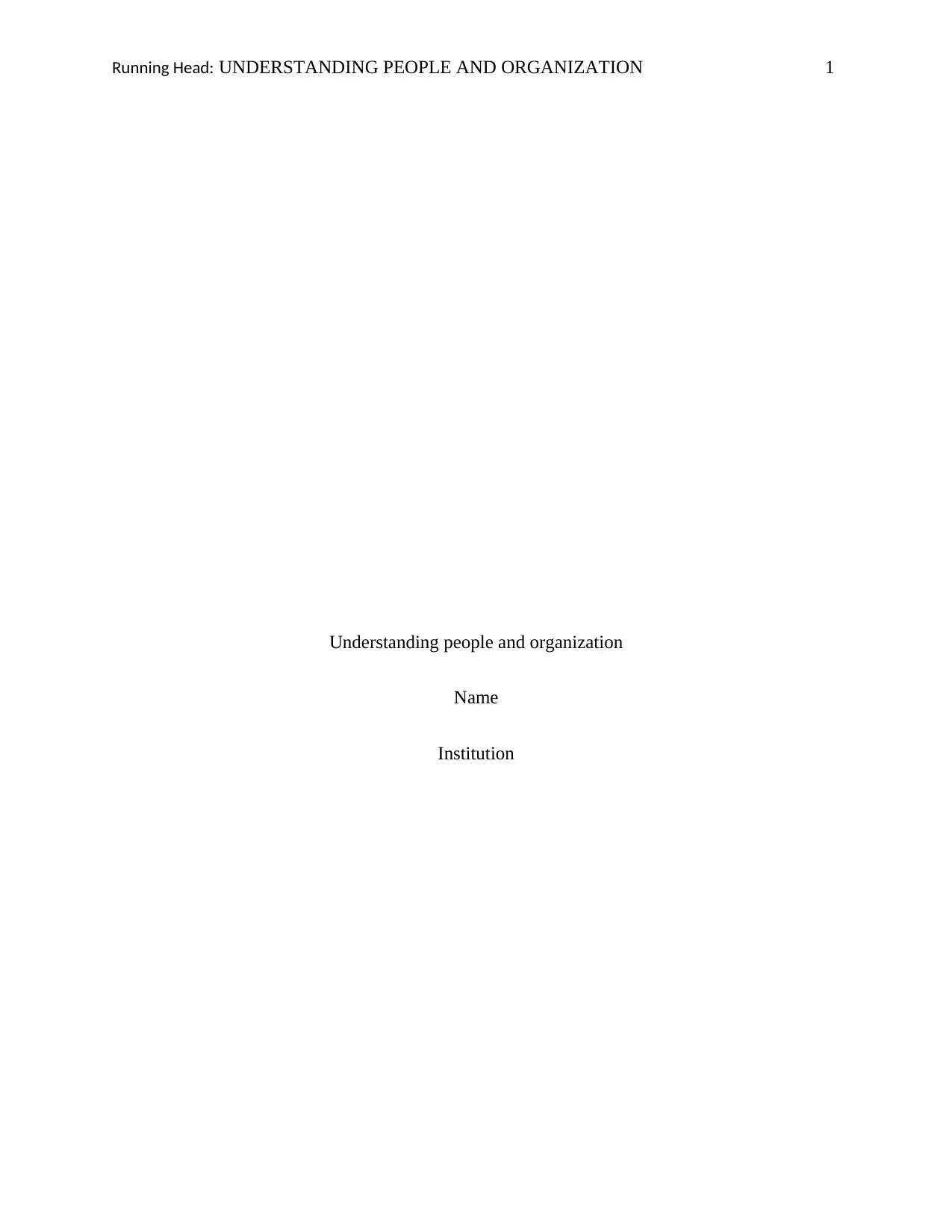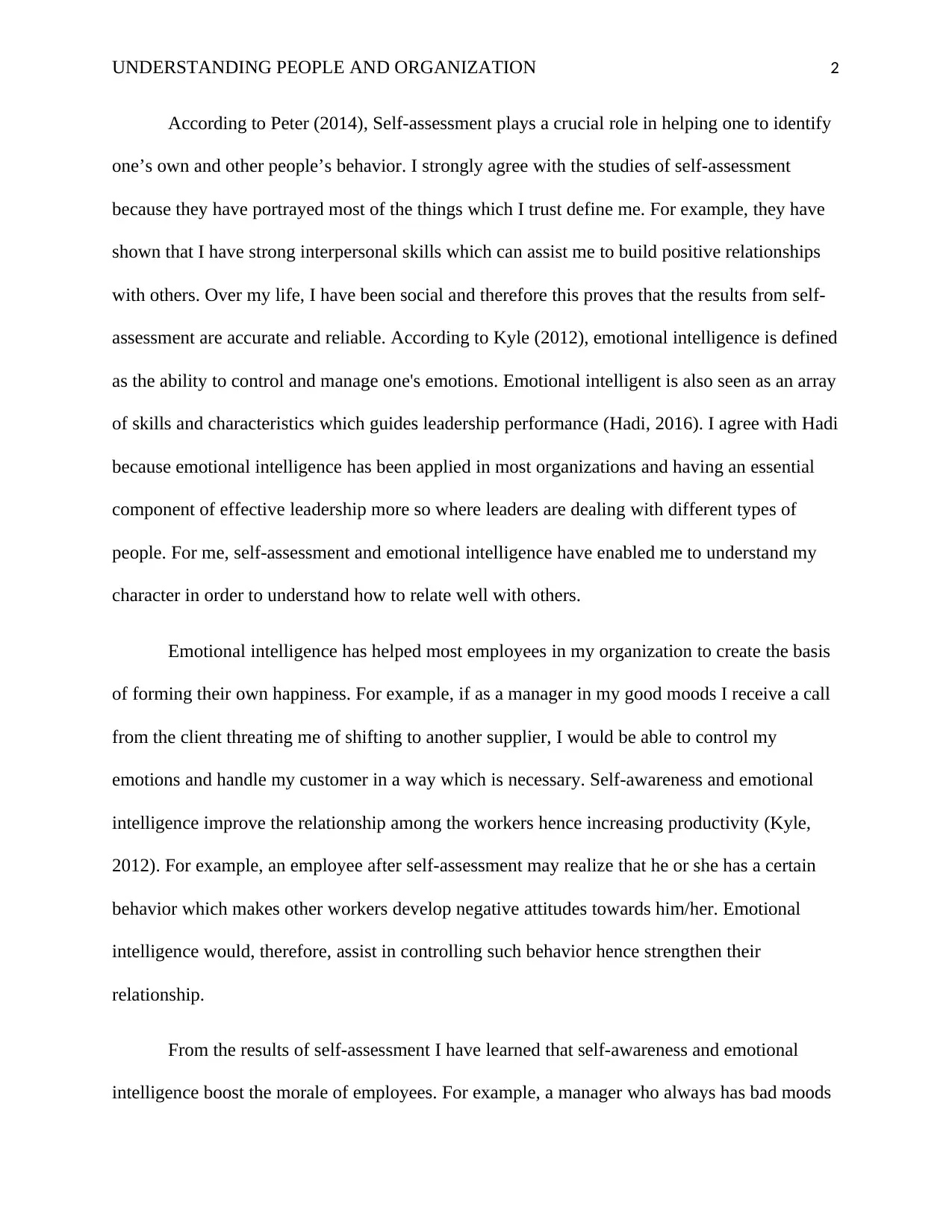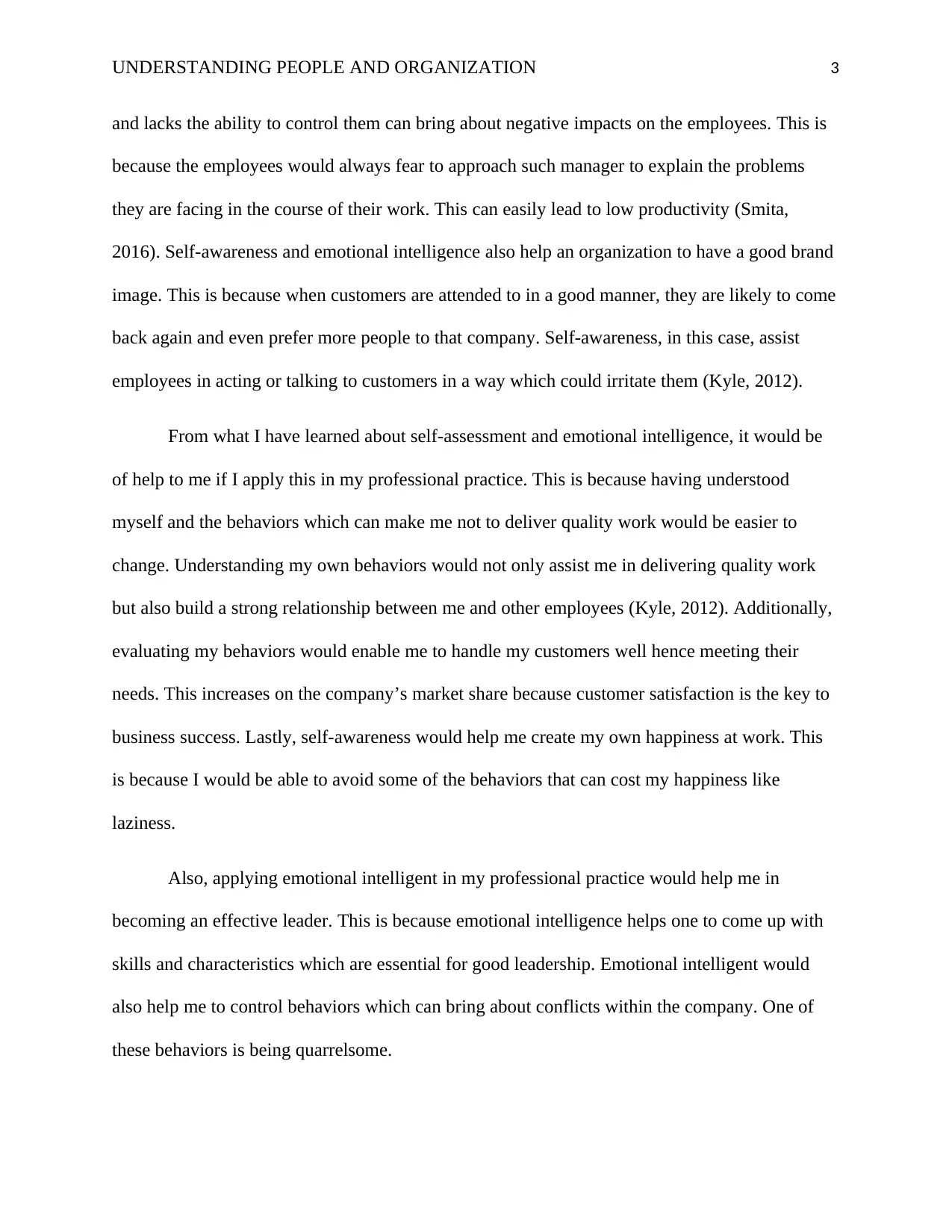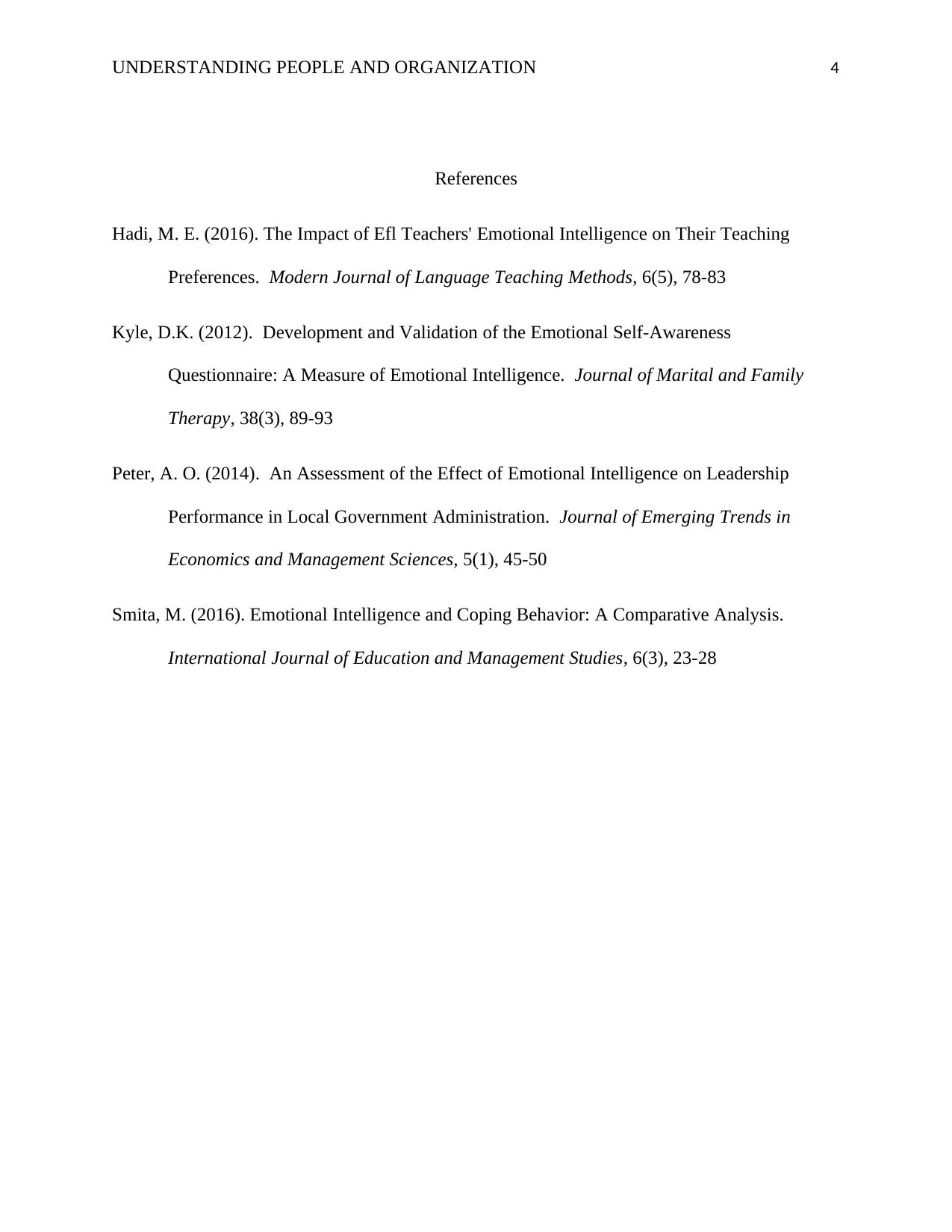BIZ102 - Reflective Journal on Understanding People and Organizations
VerifiedAdded on 2023/06/03
|4
|867
|424
Journal and Reflective Writing
AI Summary
This reflective journal explores the concepts of self-awareness and emotional intelligence within the context of understanding people and organizations. The author reflects on the importance of self-assessment in identifying personal behaviors and interpersonal skills, emphasizing the role of emotional intelligence in managing emotions and guiding leadership performance. The journal highlights the benefits of self-awareness and emotional intelligence in enhancing relationships, boosting employee morale, and improving an organization's brand image. The author concludes by discussing how applying these concepts can lead to improved professional practice, stronger relationships with colleagues and customers, and increased personal happiness at work. The author also references relevant academic sources to support their reflections.

Running Head: UNDERSTANDING PEOPLE AND ORGANIZATION 1
Understanding people and organization
Name
Institution
Understanding people and organization
Name
Institution
Paraphrase This Document
Need a fresh take? Get an instant paraphrase of this document with our AI Paraphraser

UNDERSTANDING PEOPLE AND ORGANIZATION 2
According to Peter (2014), Self-assessment plays a crucial role in helping one to identify
one’s own and other people’s behavior. I strongly agree with the studies of self-assessment
because they have portrayed most of the things which I trust define me. For example, they have
shown that I have strong interpersonal skills which can assist me to build positive relationships
with others. Over my life, I have been social and therefore this proves that the results from self-
assessment are accurate and reliable. According to Kyle (2012), emotional intelligence is defined
as the ability to control and manage one's emotions. Emotional intelligent is also seen as an array
of skills and characteristics which guides leadership performance (Hadi, 2016). I agree with Hadi
because emotional intelligence has been applied in most organizations and having an essential
component of effective leadership more so where leaders are dealing with different types of
people. For me, self-assessment and emotional intelligence have enabled me to understand my
character in order to understand how to relate well with others.
Emotional intelligence has helped most employees in my organization to create the basis
of forming their own happiness. For example, if as a manager in my good moods I receive a call
from the client threating me of shifting to another supplier, I would be able to control my
emotions and handle my customer in a way which is necessary. Self-awareness and emotional
intelligence improve the relationship among the workers hence increasing productivity (Kyle,
2012). For example, an employee after self-assessment may realize that he or she has a certain
behavior which makes other workers develop negative attitudes towards him/her. Emotional
intelligence would, therefore, assist in controlling such behavior hence strengthen their
relationship.
From the results of self-assessment I have learned that self-awareness and emotional
intelligence boost the morale of employees. For example, a manager who always has bad moods
According to Peter (2014), Self-assessment plays a crucial role in helping one to identify
one’s own and other people’s behavior. I strongly agree with the studies of self-assessment
because they have portrayed most of the things which I trust define me. For example, they have
shown that I have strong interpersonal skills which can assist me to build positive relationships
with others. Over my life, I have been social and therefore this proves that the results from self-
assessment are accurate and reliable. According to Kyle (2012), emotional intelligence is defined
as the ability to control and manage one's emotions. Emotional intelligent is also seen as an array
of skills and characteristics which guides leadership performance (Hadi, 2016). I agree with Hadi
because emotional intelligence has been applied in most organizations and having an essential
component of effective leadership more so where leaders are dealing with different types of
people. For me, self-assessment and emotional intelligence have enabled me to understand my
character in order to understand how to relate well with others.
Emotional intelligence has helped most employees in my organization to create the basis
of forming their own happiness. For example, if as a manager in my good moods I receive a call
from the client threating me of shifting to another supplier, I would be able to control my
emotions and handle my customer in a way which is necessary. Self-awareness and emotional
intelligence improve the relationship among the workers hence increasing productivity (Kyle,
2012). For example, an employee after self-assessment may realize that he or she has a certain
behavior which makes other workers develop negative attitudes towards him/her. Emotional
intelligence would, therefore, assist in controlling such behavior hence strengthen their
relationship.
From the results of self-assessment I have learned that self-awareness and emotional
intelligence boost the morale of employees. For example, a manager who always has bad moods

UNDERSTANDING PEOPLE AND ORGANIZATION 3
and lacks the ability to control them can bring about negative impacts on the employees. This is
because the employees would always fear to approach such manager to explain the problems
they are facing in the course of their work. This can easily lead to low productivity (Smita,
2016). Self-awareness and emotional intelligence also help an organization to have a good brand
image. This is because when customers are attended to in a good manner, they are likely to come
back again and even prefer more people to that company. Self-awareness, in this case, assist
employees in acting or talking to customers in a way which could irritate them (Kyle, 2012).
From what I have learned about self-assessment and emotional intelligence, it would be
of help to me if I apply this in my professional practice. This is because having understood
myself and the behaviors which can make me not to deliver quality work would be easier to
change. Understanding my own behaviors would not only assist me in delivering quality work
but also build a strong relationship between me and other employees (Kyle, 2012). Additionally,
evaluating my behaviors would enable me to handle my customers well hence meeting their
needs. This increases on the company’s market share because customer satisfaction is the key to
business success. Lastly, self-awareness would help me create my own happiness at work. This
is because I would be able to avoid some of the behaviors that can cost my happiness like
laziness.
Also, applying emotional intelligent in my professional practice would help me in
becoming an effective leader. This is because emotional intelligence helps one to come up with
skills and characteristics which are essential for good leadership. Emotional intelligent would
also help me to control behaviors which can bring about conflicts within the company. One of
these behaviors is being quarrelsome.
and lacks the ability to control them can bring about negative impacts on the employees. This is
because the employees would always fear to approach such manager to explain the problems
they are facing in the course of their work. This can easily lead to low productivity (Smita,
2016). Self-awareness and emotional intelligence also help an organization to have a good brand
image. This is because when customers are attended to in a good manner, they are likely to come
back again and even prefer more people to that company. Self-awareness, in this case, assist
employees in acting or talking to customers in a way which could irritate them (Kyle, 2012).
From what I have learned about self-assessment and emotional intelligence, it would be
of help to me if I apply this in my professional practice. This is because having understood
myself and the behaviors which can make me not to deliver quality work would be easier to
change. Understanding my own behaviors would not only assist me in delivering quality work
but also build a strong relationship between me and other employees (Kyle, 2012). Additionally,
evaluating my behaviors would enable me to handle my customers well hence meeting their
needs. This increases on the company’s market share because customer satisfaction is the key to
business success. Lastly, self-awareness would help me create my own happiness at work. This
is because I would be able to avoid some of the behaviors that can cost my happiness like
laziness.
Also, applying emotional intelligent in my professional practice would help me in
becoming an effective leader. This is because emotional intelligence helps one to come up with
skills and characteristics which are essential for good leadership. Emotional intelligent would
also help me to control behaviors which can bring about conflicts within the company. One of
these behaviors is being quarrelsome.
⊘ This is a preview!⊘
Do you want full access?
Subscribe today to unlock all pages.

Trusted by 1+ million students worldwide

UNDERSTANDING PEOPLE AND ORGANIZATION 4
References
Hadi, M. E. (2016). The Impact of Efl Teachers' Emotional Intelligence on Their Teaching
Preferences. Modern Journal of Language Teaching Methods, 6(5), 78-83
Kyle, D.K. (2012). Development and Validation of the Emotional Self-Awareness
Questionnaire: A Measure of Emotional Intelligence. Journal of Marital and Family
Therapy, 38(3), 89-93
Peter, A. O. (2014). An Assessment of the Effect of Emotional Intelligence on Leadership
Performance in Local Government Administration. Journal of Emerging Trends in
Economics and Management Sciences, 5(1), 45-50
Smita, M. (2016). Emotional Intelligence and Coping Behavior: A Comparative Analysis.
International Journal of Education and Management Studies, 6(3), 23-28
References
Hadi, M. E. (2016). The Impact of Efl Teachers' Emotional Intelligence on Their Teaching
Preferences. Modern Journal of Language Teaching Methods, 6(5), 78-83
Kyle, D.K. (2012). Development and Validation of the Emotional Self-Awareness
Questionnaire: A Measure of Emotional Intelligence. Journal of Marital and Family
Therapy, 38(3), 89-93
Peter, A. O. (2014). An Assessment of the Effect of Emotional Intelligence on Leadership
Performance in Local Government Administration. Journal of Emerging Trends in
Economics and Management Sciences, 5(1), 45-50
Smita, M. (2016). Emotional Intelligence and Coping Behavior: A Comparative Analysis.
International Journal of Education and Management Studies, 6(3), 23-28
1 out of 4
Related Documents
Your All-in-One AI-Powered Toolkit for Academic Success.
+13062052269
info@desklib.com
Available 24*7 on WhatsApp / Email
![[object Object]](/_next/static/media/star-bottom.7253800d.svg)
Unlock your academic potential
Copyright © 2020–2025 A2Z Services. All Rights Reserved. Developed and managed by ZUCOL.





